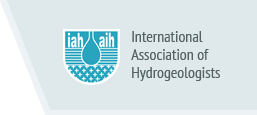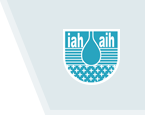Former Committee 2018-2023
Chair
Judit Mádl-Szőnyi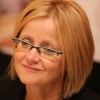
ELTE, Eötvös Loránd University
Budapest, Hungary
I had doubts about my future role in the Commission because I think a healthy rotation is necessary in such scientific groups. At the same time, I was aware of some future lines about how to continue in the RGFC. The promotion of board members and our honorary chair helped me to make the decision and submit my candidature for this position.
The RGFC was set up in 2011. Since then, the Commission and its activity, and what is more important, the regional groundwater flow concept, has become widely known among the members of the IAH. Besides this most significant result, a very active group has evolved through the contributions of our Canadian, Chinese, Mexican, Columbian, Australian and Hungarian colleagues. The knowledge transfer between these active groups has been productive, and symposia and meetings have been organized in these countries. However, this active exchange of scientific information could not involve more active members from other countries.
Therefore, my most important intention is to broaden the number of countries from which researchers are actively involved in the understanding and use of the regional groundwater flow concept and, therefore, the activity of RGFC. We need board members from every continent, not only to represent their continent, but their task should be to involve scientists from different countries and help them understand the concept.
One of the most important tasks of the RGFC is to urge research into regional groundwater flow. think that besides the 3D flow and heat transport models, variable recharge, and the detailed realization of complex heterogeneity previously suggested, we need more comprehensive goals.
We have to support theoretical and practical research in the field. Regarding theoretical research, the examination of the combined effect of different driving forces in different basin types and the examination of their effect on transport is also necessary, with 2D and later, even on 3D simulations. It would also be important to strengthen the link between theoretical results and their practical application in numerical solutions. The role of groundwater flow as a geologic agent has not received enough attention recently. This direction can help to create an opening to geology and a better understanding of geological processes due to flowing fluids (like tectonic processes, hydrocarbon migration and entrapment (conventional and unconventional), geothermal processes and the accumulation of ore deposits, microbiological effects, etc.). The efficiency of the research can be enhanced if the different groups in different countries cooperate in PhD supervision and joint research activities.
The educational activity of the RGFC started in the first period of its mandate.
I think the most efficient way to do this is the compilation of online educational materials for all levels of education, such as high school and university undergraduate/graduate level. These online materials can be accessed via the RGFC homepage. In addition to regional groundwater flow-related regular worldwide competitions, the foundation of a special prize, „Best Student Award in Regional Groundwater Flow”, could help to attract more interest.
Outreach activity has also started at a basic level in the RGFC. A joint symposium was organized by the Karst Commission, and the cooperation has begun with the Outreach and Climate Change Commissions.
I think we have to strengthen our cooperation with other commissions and related international organizations because the regional groundwater flow concept provides a new paradigm in hydrogeology over the previous „aquifer level” way of thinking. It means that all commissions and organizations out of the IAH need to understand this concept to improve their understanding of the specific field of their interest. The ECHN is a special group in IAH. I think the RGFC has to focus on the younger generation for their conceptual development. Therefore, cooperation with this group is especially important. It is also obvious that the regional groundwater flow concept is necessary to all fields of hydrogeology and other related disciplines such as geology, ecology, agriculture, etc.
The dissemination of knowledge about regional groundwater flow is also very significant. Besides the creation of the RGFC homepage, communication has started with the use of LinkedIn.
The RGFC should be more active in social media. Besides online course materials, research projects in the field should be given more publicity on ResearchGate and LinkedIn. This can be used to discuss scientific and practical questions related to regional groundwater flow.
I hope that by the end of the next period of activity, the regional groundwater concept will be better understood, and its use will be extended worldwide. The coordinated research will evolve, and the possibilities of its practical application will be enhanced. I also hope that hydrogeologists and scientists in related fields will recognise the significance of regional groundwater flow and the possibilities for its application.
Secretary
Ádám Tóth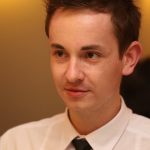
ELTE, Eötvös Loránd University
Budapest, Hungary
My basic motivation is to spread the theory of regional groundwater flow and modern hydrogeology. We need to prepare educational materials for secondary and tertiary education and also foster international communication and cooperation. I would like to serve as a secretary for the new period to coordinate the work and activities of the Commission.
Co-Chair for North America
René Lefebvre
INRS, Institut National de la Recherche Scientifique
Québec, Canada
John Molson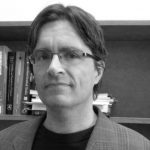
Laval University
Québec, Canada
We are very pleased to submit our candidature as joint North American Co-Chairs of the IAH Regional Groundwater Flow Commission. As discussed with the RGFC, we have proposed alternating the Chair position between us over two 3-year periods, with Dr René Lefebvre taking the first 3-year period and Dr John Molson the second period
As long-time members of the IAH-CNC, and having collaborated over many years with Dr Judit Mádl-Szőnyi, Ádám Tóth and their team at the Eötvös Loránd University in Budapest, we would look forward to continuing working with them to advance the science and understanding of regional flow. In particular, we would endeavour to act as a liaison between researchers in North America with interests in regional flow and the RGFC.
Our joint interests and expertise lie in characterizing and modelling regional flow, as well as mass and heat transport in porous or fractured porous media at regional scales. We believe some of the most important issues related to regional groundwater flow include conflicts and potential risks to groundwater resources from exploration and development of hydrocarbons, mining, and geothermal energy. There is much potential in this area within the scope of the RGFC-IAH to better understand regional flow systems. We would be very interested in advancing this area of research as part of the RGFC.
Co-Chair for Latin America
José Joel Carrillo-Rivera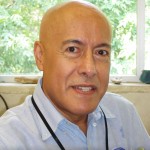
UNAM, National Autonomous University of Mexico
Mexico City, Mexico
My motivation to continue being part of the Board of the IAH, Regional Groundwater Flow Commission (RGFC), is due to the growing and strong intensity of the positive response by the general public and professionals of different areas of science that have been given the opportunity to be in touch with this methodology. In fact, I consider it most important for society, decision-makers and peers to be aware of the presence of the flow systems that resulted from the outstanding work by Professor József Tóth. It has been a rewarding task to present the flow systems and the consequent understanding of groundwater flow functioning that has been achieved by individuals, peers and decision-makers; many have become more aware of the actual role of groundwater in the environment. It is an incentive for many that the core of this theory has been proven to propose agreeable solutions to environmental issues. It is inspiring that the need to understand groundwater is to be based on agreeable interdisciplinary responses. The general public response to having a lecture or opinion from a professional that is part of the RGFC Board gives much stronger confidence value to stated views on meetings. My intention to be part of the Board of the Regional Groundwater Flow Commission, IAH, is to continue having the opportunity to be part of the actions carried out by the RGFC towards the spread of the knowledge inserted in the understanding of the functioning of the groundwater flow systems.
Co-Chair for Europe
Hanneke Verweij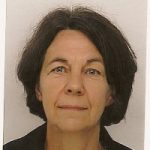
TNO, Netherlands Organisation for Applied Scientific Research
Utrecht, the Netherlands
There is increasing awareness of the need to improve our knowledge and understanding of groundwater flow systems also in deeper parts of the subsurface. This is because of increasing multiple uses of the subsurface from shallow depths to depths of several km. The sustainable, safe and efficient use of groundwater resources for water supply purposes in combination with other uses now and in the future, requires the integrated use of all available knowledge and understanding of groundwater flow systems that have been developed, often separately, in groundwater and other geoscience communities (such as petroleum geoscience).
A large part of my research career has been focused on the analysis and modelling of pressure and groundwater flow systems on a basin scale and the significance of these pressure and flow systems for the assessment and evaluation of different natural resources (groundwater, petroleum, geothermal) and geologic repositories for waste. Especially Tóth’s concept of groundwater as a geologic agent has motivated me to use and integrate a wide variety of data and information from different geoscience disciplines to improve my insight into the pressure & flow systems and hydrogeological framework in sedimentary basins. These pressure and flow systems included systems that occur below the regional gravity-induced flow systems.
I would like to introduce and communicate my knowledge and expertise in both groundwater geoscience and petroleum geoscience and the integration of both to the Regional Groundwater Flow community by organizing meetings/workshops, stimulating research, and writing publications. The possible focus of my contribution could be on the following two related topics:
1. Flow systems in the deeper parts of sedimentary basins, especially in the realm of the interaction of regional gravity-driven flow systems with stress-related systems, such as pressure and flow systems related to sedimentary loading or tectonic loading;
2. Use of data, knowledge, concepts, and tools from petroleum geoscience and make them fit for purpose for improving the hydrogeological characterization of the subsurface and the understanding of pressure and groundwater flow systems, also on larger spatial and timescales.
Co-Chair for Africa
Fadoua Hamzaoui Azaza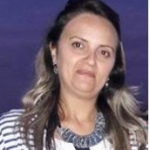
University El Manar
Tunis, Tunisia
About my motivation and what I intend to do in the frame of RGFC-IAH, in fact, although I am starting learning about the flow systems recently, I have co-organized two related meetings on flow systems in Tunis. Also, the Tunisian IAH-Chapter has already acknowledged the participation of a flow systems session in the Hammamet Meeting (March 2018). I will try to continue co-participating in organizing such events with Dr Carrillo as further meetings (workshops and courses) here in Tunisia. It appears that Dr Carrillo will spend some half-sabbatical in Tunis, this might be an opportunity to get more involved in the RGFC. My motivation is that this methodology appears to explain, in a better manner, groundwater functioning, the concept needed to complement our current studies and teachings in hydrogeology. My intentions are simply those of a groundwater researcher and professor willing to learn more about this theme and to try to teach it to students for their further application.
Co-Chair for Asia
Xiao-Wei Jiang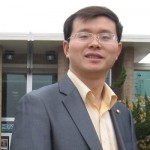
China University of Geosciences
Beijing, China
The general motivation is to further develop and promote applications and to increase the popularity of the theory of regional groundwater flow. The motivation can be achieved by the following measures.
By conducting research on 3D regional groundwater flow, transient regional groundwater flow, and characterizing flow systems by various methods to further develop the theory of regional groundwater flow.
By teaching of the theory of regional groundwater flow to undergraduate and graduate students to promote applications of the theory of regional groundwater flow.
By giving presentations and organizing sessions on regional groundwater flow at international conferences to increase the popularity of the theory of regional groundwater flow.
Co-Chair for Australia
Okke Batelaan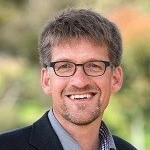
Flinders University
Adelaide, Australia
My motivation is still that I believe we need to rally support for further research on the understanding of the occurrence of RGFS. I also believe there is a lot of work that needs to be done to move the groundwater research and management community away from aquifer thinking towards system thinking.
I can probably best help in supporting joint publications and meetings.

